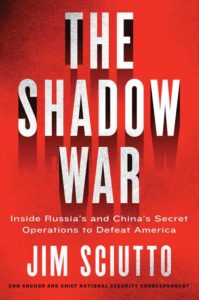Reviewer: Dr John Battersby
Review published in National Security Journal, 29 August 2021
Download full PDF version – Book Review: Inside Russia’s and China’s Secret Operations to Defeat America
Jim Sciutto, The Shadow War: Inside Russia’s and China’s Secret Operations to Defeat America, Harper (NY, London, Toronto, Sydney, 2019). ISBN 978-0-06-285366-0. 320 pages.
 This book includes chapters on the Russian cyber attack on Estonia in 2007, Chinese HUMINT operations in the US which extracted key intelligence on US military hardware, Russia’s intervention in the Ukraine, China’s construction of island bases in the South China Sea and the use of military and non-military intimidation tactics to assert effective sovereignty over territory and sea space other countries claim, the weaponisation of space, the 2016 US election hacks as well as submarine operations involving the US, Russia and China. The book concludes with a summary of the author’s views on the state of the ‘shadow war’, and what the US (and the West) need to do about it.
This book includes chapters on the Russian cyber attack on Estonia in 2007, Chinese HUMINT operations in the US which extracted key intelligence on US military hardware, Russia’s intervention in the Ukraine, China’s construction of island bases in the South China Sea and the use of military and non-military intimidation tactics to assert effective sovereignty over territory and sea space other countries claim, the weaponisation of space, the 2016 US election hacks as well as submarine operations involving the US, Russia and China. The book concludes with a summary of the author’s views on the state of the ‘shadow war’, and what the US (and the West) need to do about it.
This is a thoroughly well-constructed, well-evidenced discussion of the ‘shadow war’. This is not about a new Cold War that may be about to happen – this book is about a simmering conflict already commenced, over traditional and new contested spaces using an array of new tactics. Modern communications reliant on the boundlessness of the internet of things and exponential growth of satellite technology has opened fissures into which well-planned and well-resourced Russian and Chinese covert operations have been activated. We have walked into an absolute dependence on modern cyber and satellite-based services, without comprehending the need for either securing these assets, or securing ourselves from illicit, terrorist or espionage actors who exploit them. Nor have we secured ourselves any Plan B. If a war in space was to occur – a frighteningly real possibility in Sciutto’s analysis – what would we do if our GPS, mobile phone systems, internet and mobile phone systems, financial systems – even our traffic lights, all suddenly ceased to function? If this occurred, we would not be sent back to the Stone Age, but it would feel like it. The fragile millennial generation probably couldn’t cope.
Sciutto states frankly he is an American and concerned about the security of his country – and as a reader of a clearly compelling argument, I was constantly trying to think what America looks like to the protagonists he focuses on. Russia has had to endure the crumbling of the Soviet Union, the ending of the Warsaw Pact, grim internal economic and political struggles and the encroachment of NATO in its near abroad. China has long lived with the US Navy in a sea it regards as its own, with bases far closer to China’s borders than those of the US. Is the re-rise of Russia, and the emergence of China not just a reflection of what the US has done for a long time? Authors in a recent Indo-Pacific issue of National Security Journal posited varying views and alternative ways to look at the rise of China in the Pacific, including the possibility that we see what we fear, and we interpret everything China does to fit that pre-conception. Does Sciutto do that?
Sciutto is an experienced foreign correspondent clearly able to research and collect material with which to evidence the assertions he makes. Sciutto colours his account by personal experience of actually being on a US submarine on its tactical hunter-killer exercise under the Artic ice, and recounts his twofold experience in a US Boeing P-8 Poseidon Surveillance aircraft looking down on what were once rocky outcrops in the South China Sea. He describes seeing these now fully operational militarised maritime air and naval bases. He gives compelling descriptions of ‘kidnapper’ and ‘kamikaze’ satellites in space. He forces the reader to confront the reality that there is nothing stopping the weaponisation of space. Consequences of a war in space are serious. Forget global warming, if the worst of Sciutto’s possibilities come to pass – the globe will not last that long.
Answering the question above, no – he does not. Sciutto has a well-founded argument to be seriously considered. Sciutto seeks to raise awareness of the problems America faces, but he also challenges all democracies to face up to their vulnerabilities. Key political divisions, social issues, economic disparities – all part and parcel of free capitalist societies are fair game for Russia and China and the tactics they are employing. These powers are undemocratic, led by single parties, dominated by ‘elected for life’ leaders who see weaknesses in democracy as theirs to exploit. Try as we might to see the world how others see it, it is unlikely those who threaten us will do the same.
Read this book.
By John Battersby
Centre for Defence and Security Studies
Massey University
_________________
